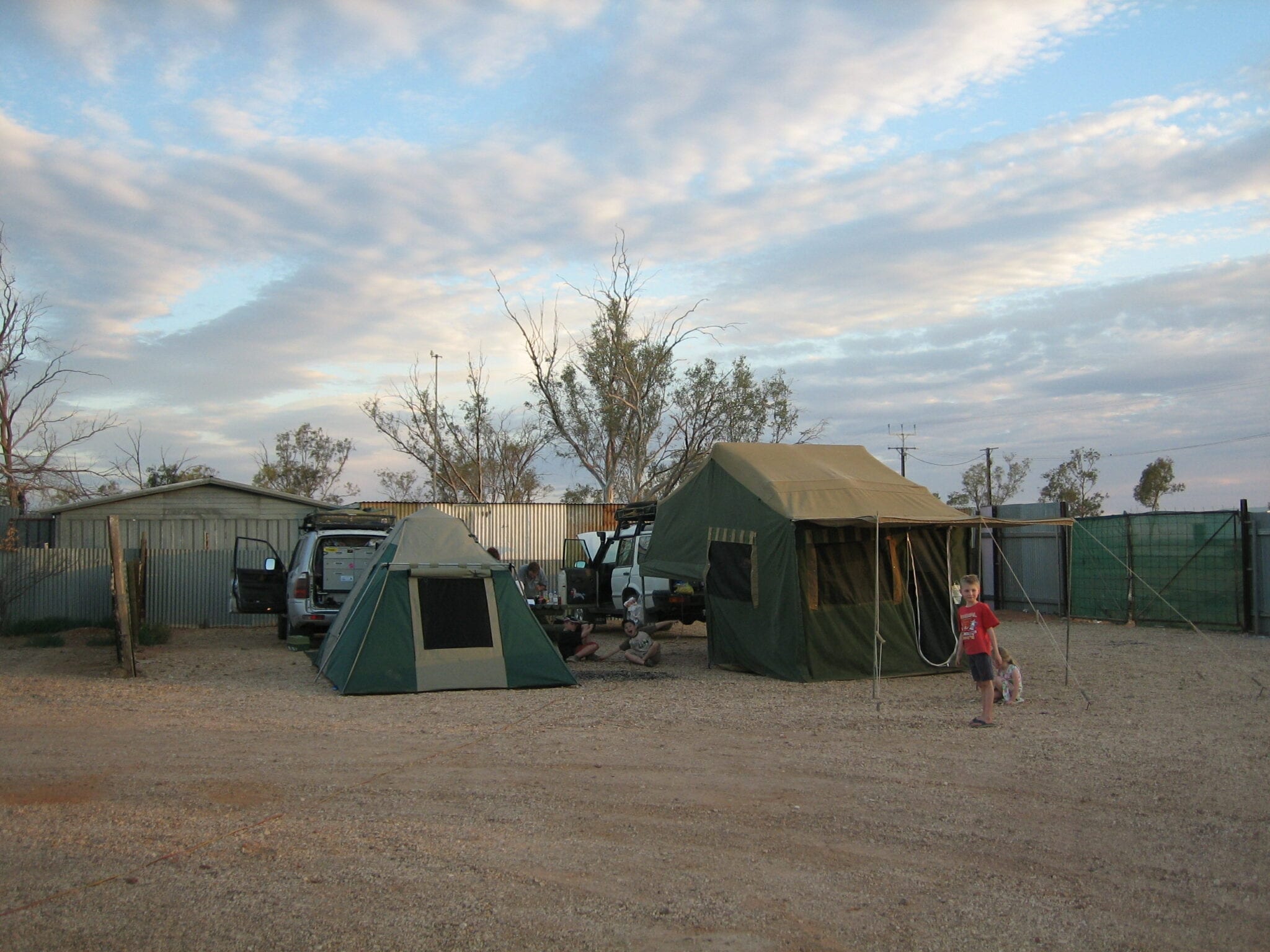Note: This article contains an affiliate link to AWAI. If you click through and make a purchase, we earn a small commission at no extra cost to you.
Unless you have a rich uncle or you’re counting on an inheritance from a king in an African country, affording a full-time life on the road is all about living with less.
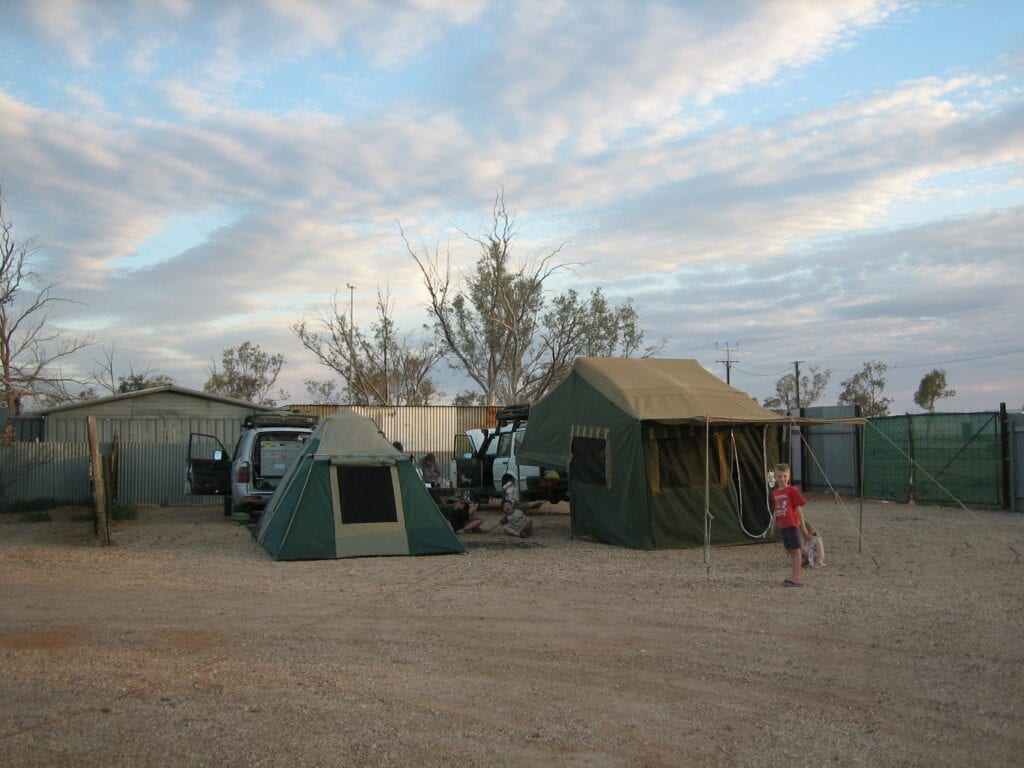
Is this a good thing or a bad thing?
It depends how you look at it. Do you want to travel full-time, to get away from the daily hamster wheel of needing more and more money… more money to buy all those “things”? You know, all those things we buy to make us happy for 5 minutes.
It’s called consumerism.
If you’re really determined to change your life, learn how to live with less. Start with a plan to save a nest egg to cover expenses for the first six months or so.
We’ll cover some thoughts and ideas on how to save, and what you need to consider before hitting the road.
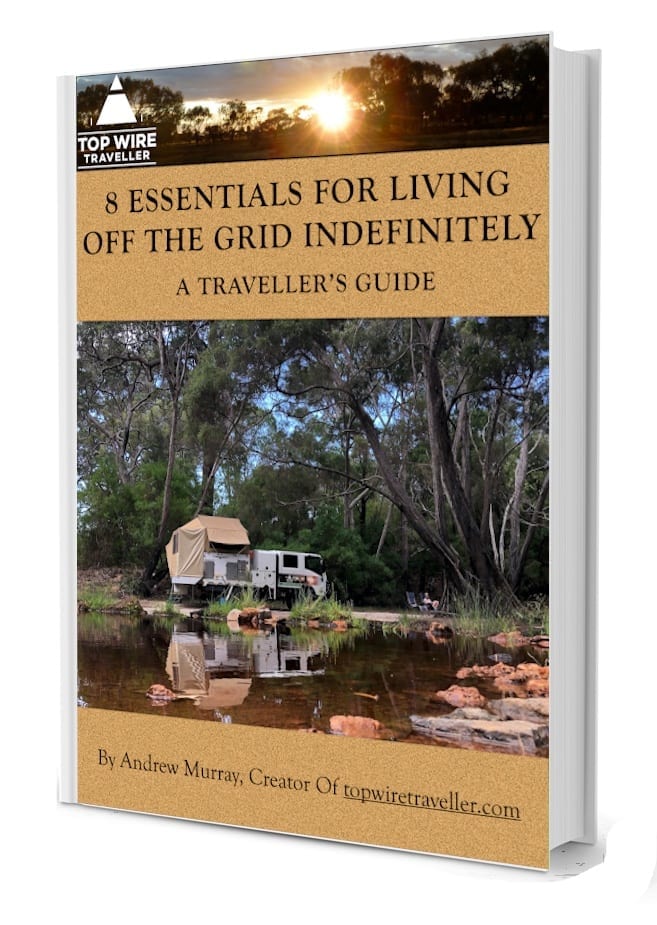
Free Download:
The 8 Essentials You Need To Live Off-Grid
…and don’t worry, eating raw fish isn’t one of them!
Do You Really Need to Save Beforehand?
Everyone’s different. Some people make a snap decision and take to the road. They find work and manage as they go.
I wish I could be so free and easy. However, I’m a bit more of a “prepper”. I need a plan.
If this is more like you, then you’ll want some savings before you hit the road. Here’s a rough plan of what we did to give you some ideas.
(Click infographic to enlarge).
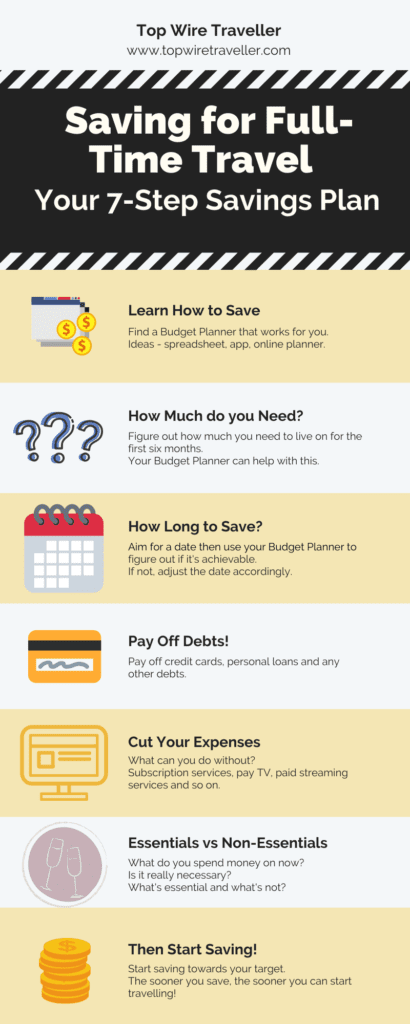
Share this Infographic On Your Site
We’ll look at each in more detail:
- Learn how to budget. Search for budget planners online or use a smart phone apps. Find one to suit your needs and most importantly, one you’ll actually use. This is just one example of a detailed Budget Planner.
- Decide how much you need to survive the first six or twelve months. Be honest, include all expenses like insurances, rego and vehicle maintenance.
- How long will it take to save your target figure? This is where the budget planner is invaluable. You’ll get a realistic timeframe of how long it will take you to save.
- Pay off debt. You need to pay off high interest debts like credit cards as soon as possible. Consider cutting up all but one of your credit cards.
- What can you get rid of? Look at online subscriptions, pay TV, paid streaming services and so on.
- What can you do without, and what can’t you do without? Work your way through the things you spend money on now and decide if they’re really necessary.
- Then start saving!
And remember what I said about living with less? Change your spending habits and start saving. Stop buying those “nice to haves” and stick to the essentials. Do you really need a new lounge or a new bed? Or can it last a bit longer?
Every little bit you don’t spend is another bit you’ve saved.

A common mistake is to set an unrealistic weekly savings goal. It’s a bit like a starvation diet. You might be keen for the first week, then it becomes too hard.
Give yourself some breathing space. Treat yourself occasionally.
There’s another benefit to this living with less mindset. By the time you start travelling, you’ll be used to it. It’ll become normal. So you won’t spend as much while you’re on the road.
So now you’ve started saving, what else do you need to think about?
The Decisions You Need to Make
We’ll start with your home. Whether you own, rent or are paying off your home, you still need to consider a few options.
Sell, Rent or Lock Up?
If you own or are paying off a house, you have a few options.
Sell Up
The first one is to sell up and invest the proceeds. This of course depends on how much equity you have in your house.
But it can be a high mental hurdle to jump over.
Selling up just seems so final, so permanent, so “forever”. And it can be difficult to buy back into the same market down the track.
Having said this, selling up and travelling permanently works well for many people. And for some, it’s the only way they can afford to travel full-time. We’ve met many who have made the leap and they all seem pretty content with their decision.
Rent Your House Out
The next option is to rent your house out. This is the path we took… kind of.
When we travelled for 12 months with the kids, we rented the house to a family. This was done through a real estate agent who was recommended to us. It worked out okay, I guess.
Small things annoyed us no end though. We specifically stipulated no dogs, yet discovered they’d had a dog in the house for the entire 12 months. There was some minor damage and plenty of dog hair, but nothing to worry too much about.
On the whole though, it worked okay. Most importantly, the rent covered our mortgage repayments.
This time around, we took a different approach. It has been a disaster.
Our youngest son still needed somewhere to live, so he stayed there as manager and we rented the other rooms individually. We did it privately. Don’t do this!
When you rent each room individually:
- There’s endless ill-feeling about who should be cleaning the common areas,
- The tenants have no incentive to find new flat mates when one moves out. They’re only paying for their room, so they don’t care if a room is vacant. For the 18 months we rented out our house, one of the three rooms was vacant for 12 months all up.
- Finding new tenants when you’re thousands of kilometres away is all but impossible. And how do you keep the house presentable for prospective tenants? The existing tenants don’t care whether the house is clean or dirty and have no incentive to make the house presentable.
- Similarly, organising repairs remotely is difficult.
- Worst of all though, is when one tenant moves out. In theory, they’re responsible for cleaning the house to the same standard as it was when they moved in. In practice, how do they do this when other people are still living in the house?
Our advice? Don’t even contemplate renting out rooms individually. It’s an absolute minefield of stress and conflict.
In hindsight, we should have handed it over to a real estate agent, rented it to a family, helped out our son with rent somewhere else and paid for storage for our contents.
So why did we do this in the first place?
It wasn’t greed. We wanted a place for our son to live while he did an apprenticeship. It seemed logical for him to stay in the house. So the next logical step was to rent individual rooms. This way, our son had somewhere to live. We could leave our furniture there and store everything else in our garage.
Obviously it didn’t work out. Lesson learnt.
If you’re going to rent out your house, hand it over to an agent and let them handle it. Whichever way you go, budget for the house to be vacant for some of the time. As a rough guide, assume it’ll be vacant for 2 months every year.
If it’s not, you’ll have a bonus. If it is, you’ll be prepared.
And have a separate account for maintenance. What you put aside every week depends on the condition of the house. Between $50 and $100 per week is a good guide.
Downsize
Another option is to downsize. We’ve sold our house and bought a townhouse. We’ve invested the left-over funds, and use the interest to help fund our full-time travel. Our youngest son also lives there.
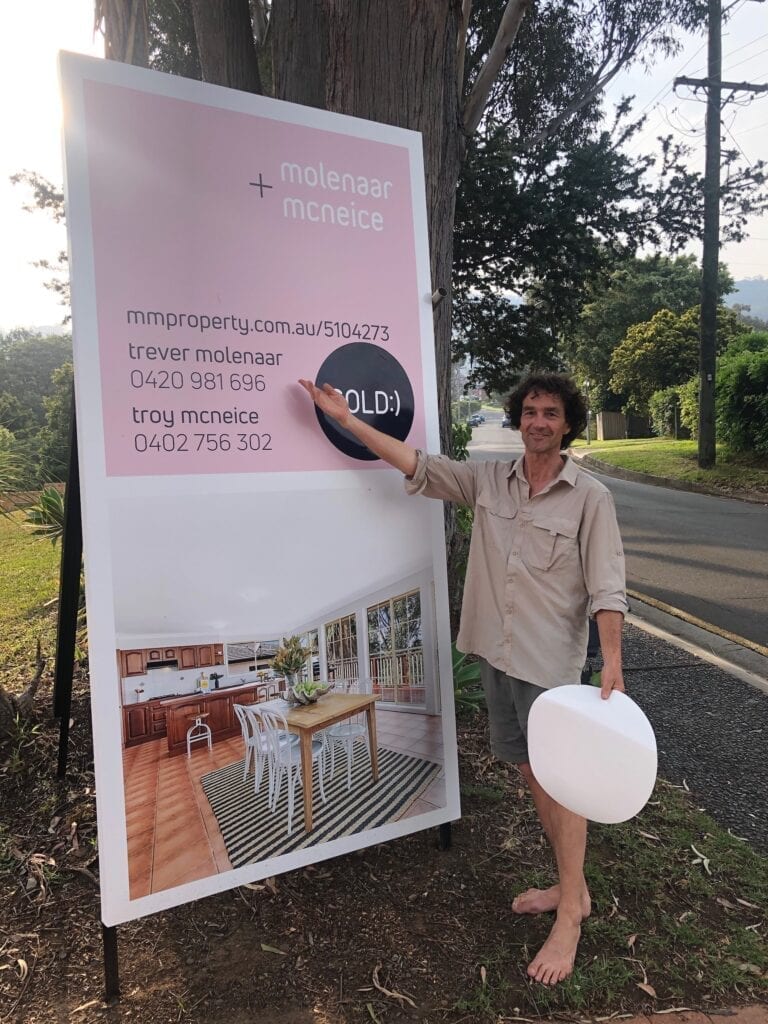
Another unforeseen benefit is having somewhere to stay when we’re home. Incredibly, in 18 months we spent over $3,500 staying at the local caravan park! I guess we didn’t expect to be at home as much as we’ve had to be.
The other benefit is we have somewhere to put our contents.
So if you’re financially able to, downsizing can be a good option. Just remember to factor in the real estate commission, stamp duty and other costs like legal fees, painting and so on.
Lock The Door and Leave
This is popular with older people who own their home. They tend to alternate between travel and being home for a few months at a time.
It can be a good option if you’re in a financial position to do this. And hopefully you know someone who can check the place occasionally.
House-Sitters
A variation of locking the door and leaving, is to have house-sitters while you’re away. This seems to work well for many people and is worth considering.
House-Sitting
Or maybe you sell your house and become house-sitters in your home town. And when you need to come home, home-sit instead of paying to stay at the local caravan park.
The timing can be tricky though. If you have to be home on a certain date or at short notice, you might not be able to line up a house-sitting gig.
Rent Something Cheaper
If you’re renting, you’re potentially in a much better position. You don’t have to figure out what to do with your house. Of course the downside is you obviously can’t use it to partially fund your life on the road.
It might be worth moving to a cheaper place and paying the difference into your travel fund.
Terminating Your Lease
Find out how to terminate your lease once you have a departure date.
The biggest issue is what to do with your things. Some people sell all their furniture and just keep momentos, which they store at a friend or relative’s place.
The most common approach is to rent a storage unit. Or if you have a willing friend with space, maybe negotiate a chunk of space and pay them a small monthly storage fee.
Insurance
You need to think about contents insurance and factor it into your budget. What happens if you gear is stored in a mate’s garage and their house burns down, for example?
Talk to your insurance company. Tell them what you’re planning to do and ask about your options. If their answer doesn’t sound satisfactory, call another insurance company for advice and a quote.
Pay Off Debt
Any debt is expensive. It erodes your ability to save. High interest debt like credit card debt can quickly build to any unmanageable level.
Make a plan to get rid of any debts… credits cards, personal loans and so on. Pay these off before you start saving.
We spoke about mortgages earlier. Rent out your place to cover the repayments or sell it and discharge the mortgage.

What Vehicle Will You Travel In?
This is a complete topic on its own. Suffice to say that your setup will impact on where you can and can’t go. For example, a luxury motor home or on-road caravan limits you to the blacktop.
In contrast, a kitted out 4WD or truck camper will mean you can go just about anywhere.
Or maybe a station wagon with a tent or swags suits you fine. Whatever the price bracket and level of comfort, keep in mind it’s all about living with less.
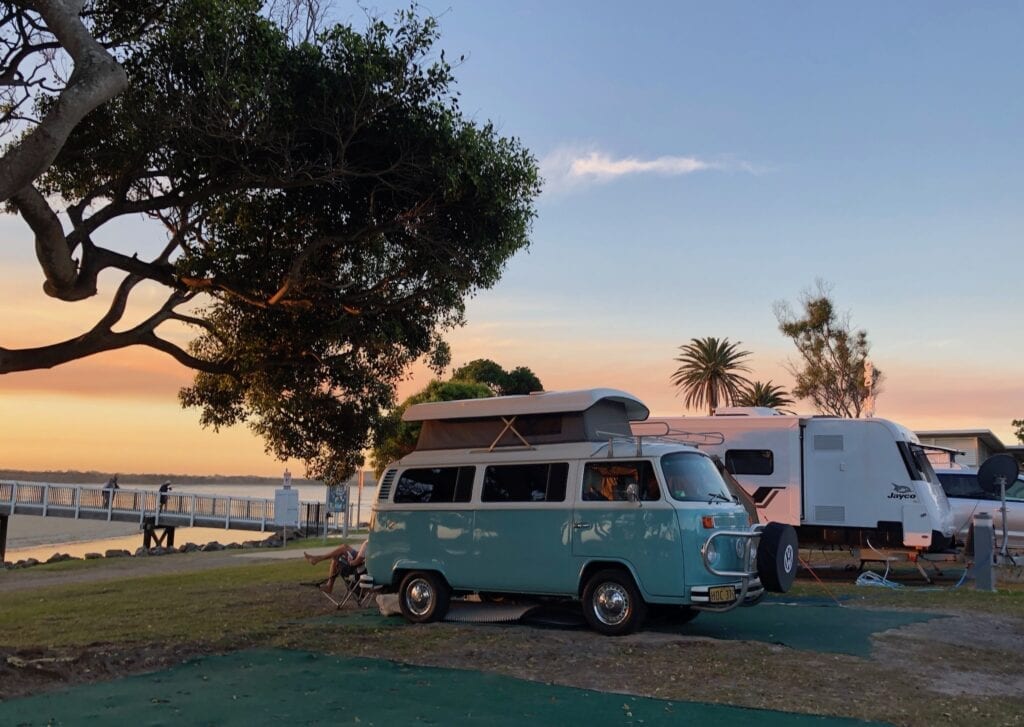
Budget to buy what you’re comfortable with. After all, you’ll be living in it full time.
Keep a lid on it though.
If you already have a 4WD, do you really need to buy a new one? Are the winch and expensive mud tyres really necessary?
Or maybe you’re looking at caravans. Do you really need every conceivable feature known to mankind? Or can you get by happily with a basic fit-out?
In Summary
If you’re one of those people who gets by without a plan then honestly, I’m jealous! Figure it out as you go and worry about the details later.
You’ve read this far though, so I’m guessing you’re a planner! Make a savings plan and stick to it. Keep your plan simple and stay focussed on saving.
It really is all about living with less. Simplify how you live and break away from the endless loop of consumerism. Not only will you feel better about yourself, you’ll be amazed how much more you’ll save… money to fund your dream life on the road.
Next time we’ll talk about how you can live cheaply on the road, while still being able to do the things you want to.
For more tips and ideas on preparing for full-time travel, go here.
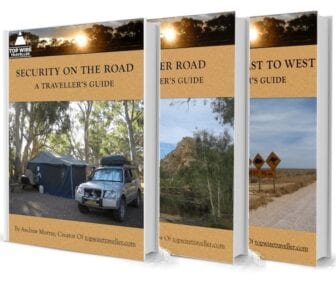
Get your Traveller’s Guides
… and a whole lot more at our FREE RESOURCES Page!
Any questions or comments? Go to the Comments below or join us on Pinterest, Facebook or YouTube.
Any errors or omissions are mine alone.

